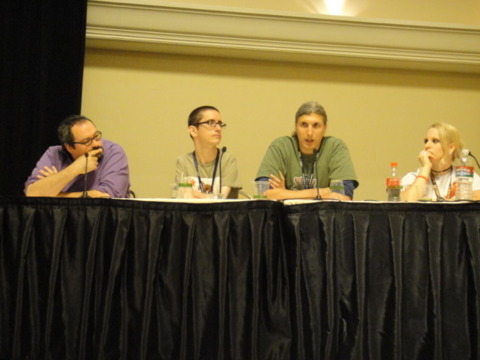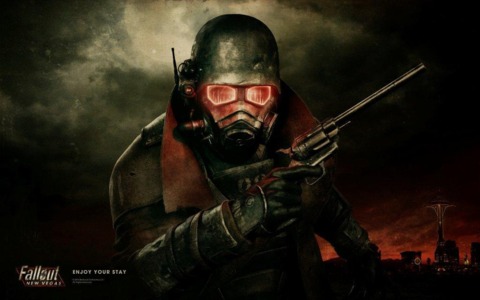RPG writers spill their secrets
PAX 2011: Authors from ArenaNet, Obsidian, Warner Bros., and DoubleBear gather to discuss the many challenges in writing for role-playing games.
Who was there: This Penny Arcade Expo 2011 panel included writer John Gonzales from Warner Bros. Interactive Entertainment; writer Travis Stout from Obsidian Entertainment; content designer Annie VanderMeer Mitsoda from ArenaNet; and creative director Brian Mitsoda from DoubleBear Productions.

What they talked about: Just like saving the galaxy or uniting a fractured kingdom, writing for a role-playing game is a massive undertaking. OK, maybe it isn't that massive, but keeping track of all the heroes, villains, and non-player characters while weaving a cohesive story is challenging. To make this process as painless as possible, the panelists stressed the importance of having the narrative and design departments of a game collaborate at a very early stage in development. This way they can be made aware of upcoming changes, either to the gameplay or to the story, and can adapt accordingly.
Change can become a serious issue once voice actors are added to the mix. "How many of you have heard this before: 'I'll mark this location on the map?'" Annie asked. There's a good reason for that level of ambiguity. The voice actor should never say anything too specific unless it's definitely going into the game. "Don't ever have a character say, 'I'll give you 500 gold pieces for killing this dragon,'" Stout said, "because design will up and change it on you." The dragon fight may be moved until later, or the reward may be altered.
Writers have to master the art of vague specifics, said Stout. There's an art to making it clear to the player what they need to do without actually telling them what they need to do.
While instructions may be vague, characterization needs to be clean and concise. When writing a new hero, or villain, Annie said the author has to look at what that character will be doing through the game, build around that, and visualize that character's personal arc. No one wants a character whose message and actions don't line up.
While this may be easy if a game has a small, clearly defined cast, typical RPGs have so many characters it would be impractical to try to have one person keep track of them all. Therefore, the task is typically assigned to a writing team. "At Obsidian we have a head writer who makes sure everything is cohesive," said Stout. "He writes all the plot-critical NPCs and keeps the game's themes in check. Then there is a team of writers who support him and fill out the other characters."
"The trend in games now is for story to be front-loaded more and more in development," Gonzales added. In the past the story typically came later; now it's at the very beginning since you need someone working in concert with design and art to ensure everything flows smoothly in development. Everybody who is working on a game is a storyteller, so it's important to have someone who can champion narrative values and their importance.

During the question and answer session, one audience member asked how the panelists overcome creative disagreements between writers. Gonzales said it's the lead writer who makes the final call, but a better solution is to have the writing team debate the issue and try to reach an agreement. "The discussion could spark a new idea that could be a better approach [for the character]," Stout added. "You just have to talk things out."
Quote: "The more people you can get excited about a character, the better and stronger that character will be."--Annie Mitsoda, on teamwork and writing new characters.
Takeaway: Journals, diaries, and audio logs are the unsung heroes of the role-playing universe. Should a character die prematurely, players can always count on finding a convenient recap of everything they need to know. This is just one of the many tools writers have developed to account for player choice, especially in open-world RPGs. When the player can go anywhere and kill (almost) anyone, it can be challenging to handle issues of pacing and story progression. However, it's nothing several white boards and a keen eye for details can't fix.
Got a news tip or want to contact us directly? Email news@gamespot.com
Join the conversation